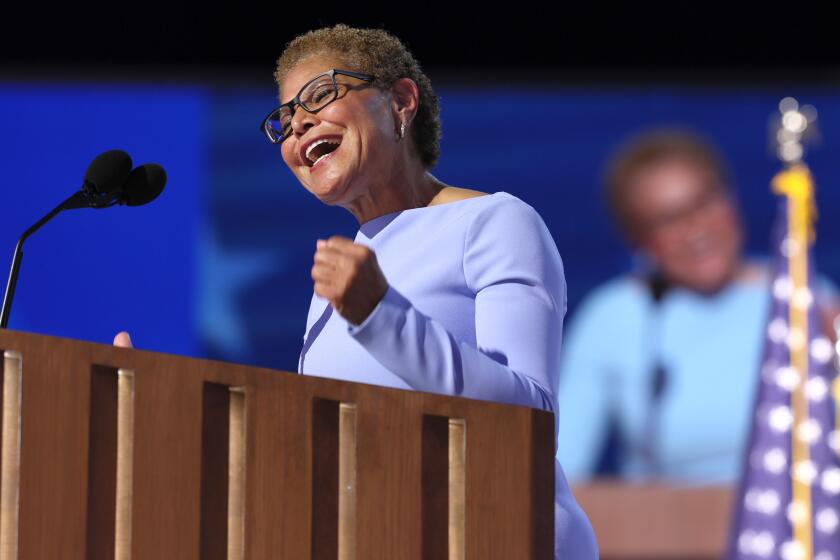Gov. Pulls Plan to Abolish Panels
Admitting defeat in one of his first concerted efforts to reshape state government, Gov. Arnold Schwarzenegger on Thursday withdrew his proposal to abolish 88 independent boards and commissions, including ones that regulate doctors, accountants and other California professionals.
The governor wants to restructure the way Sacramento has functioned for decades -- or, as he frequently says, to “blow up the boxes.” Other changes he is demanding include altering the pensions that public employees receive, the way voting districts are designed and the manner in which state budgets are set.
Schwarzenegger’s plan to eliminate the 88 panels was one of two concrete reorganization plans that so far have come out of the California Performance Review, which the governor convened last year to recommend improvements in the state’s expansive bureaucracy.
But this proposal barely made it out of the starting gate. Lawmakers in both parties, along with hundreds of other affected groups and individuals, rushed to the defense of the panels, which provide advice on heart disease, high-speed railroads and racial profiling in addition to regulatory functions.
“The governor said, ‘I’m going to blow up the boxes,’ and people said, ‘Hey, wait a minute. This is my box and you don’t even know what’s in it,’ ” said state Sen. Liz Figueroa (D-Fremont), who heads the upper house’s Governmental Organization Committee.
Schwarzenegger withdrew the plan before it had even gone to legislators. Under state law, reorganization proposals must first be evaluated by the independent Little Hoover Commission, and the reception there was overwhelmingly hostile.
The panel was set to vote on the proposal next Wednesday. Although its recommendations to lawmakers are advisory only, a negative assessment would have made the Legislature’s consent to the governor’s changes unlikely.
Schwarzenegger acknowledged as much in a letter to the commission Thursday. “Based on written and oral testimony submitted at your hearings,” he wrote, “I have concluded that this proposal will benefit from further review.”
Unlike in some of his successful fights last year, when he teamed up with the Chamber of Commerce or other powerful lobbies, Schwarzenegger went into this battle alone.
The opposition to his plan was both intense and diverse. It included the professional associations for most of the regulatory boards that were slated for elimination, as well as some groups that had been aligned with the governor in the past.
The commission said it had received more than 2,000 letters about the proposed reorganization, only 52 of which supported it (and most of those had to do with off-road vehicles).
Some of the strongest pleas concerned some of the most obscure boards. Dozens of Asian groups and 19 members of Congress attacked his plan to get rid of the Commission on Asian and Pacific Islander American Affairs.
Schwarzenegger had insisted that the plan would not cause dramatic changes because most of the functions of the abolished panels would be transferred to state agencies under his control. But Little Hoover commissioners and others raised concerns that agencies would not be as available to the public as the boards are.
They also said the plan would save a negligible amount, even though the performance review had promised $32 billion in savings over five years.
Schwarzenegger had criticized the boards as bloated bureaucracies, telling the Legislature last month that “no one paid by the state should make $100,000 a year for only meeting twice a month.”
In fact, most board members are either volunteers or receive nominal payments each time they meet -- $50 or $100 a day.
“If you were at that first Little Hoover Commission hearing, it was very clear the whole thing was a nonstarter,” said Julianne D’Angelo Fellmeth, administrative director of the Center for Public Interest Law at the University of San Diego School of Law.
“Those commissioners grilled the administration witnesses for three hours,” she said. “There wasn’t really anything at all about the proposal that the commissioners liked. And they asked a lot of good questions, and there were not a lot of answers,” she said. “It’s heartening to see that the governor is now listening.”
Schwarzenegger also attracted criticism when he altered the performance review’s recommendations by protecting some panels that had been slated for closure and adding others for elimination -- including those overseeing doctors and nurses -- that had vocal and influential memberships.
“It was destroying his credibility, because the proposal was going counter to his own CPR proposal,” said Deborah Burger, president of the California Nurses Assn.
An aide to Schwarzenegger said the governor would try to work out a revised plan in consultation with the Legislature. That would be a major concession, because Schwarzenegger had submitted this initial plan under rules that allowed lawmakers only an up-or-down vote after the Little Hoover panel finished its analysis.
Some of his allies are trying to make it easier for him to get any future reorganization plans through the Legislature. A proposed ballot initiative would require a two-thirds vote in the Legislature to block a reorganization, instead of the simple majority now required. In practice, that would mean that the Democratic majority could not block one of his reorganization plans unless the Republican minority agreed.
Schwarzenegger’s other CPR-inspired proposal, which would alter the way the state’s troubled prison bureaucracy is organized, faces better prospects. Key legislative leaders have supported it. The Little Hoover Commission plans to make its recommendation Wednesday.
More to Read
Get the L.A. Times Politics newsletter
Deeply reported insights into legislation, politics and policy from Sacramento, Washington and beyond. In your inbox three times per week.
You may occasionally receive promotional content from the Los Angeles Times.










